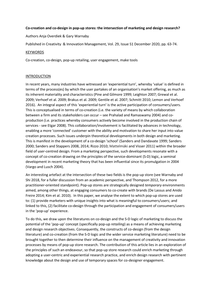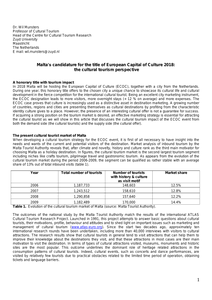Co-creation as a concept and process has been prominent in both marketing and design research over the past ten years. Referring respectively to the active collaboration of firms with their stakeholders in value creation, or to the participation of design users in the design research process, there has arguably been little common discourse between these academic disciplines. This article seeks to redress this deficiency by connecting marketing and design research together—and particularly the concepts of co-creation and co-design—to advance theory and broaden the scope of applied research into the topic. It does this by elaborating the notion of the pop-up store as temporary place of consumer/user engagement, to build common ground for theory and experimentation in terms of allowing marketers insight into what is meaningful to consumers and in terms of facilitating co-design. The article describes two case studies, which outline how this can occur and concludes by proposing principles and an agenda for future marketing/design pop-up research. This is the peer reviewed version of the following article: Overdiek A. & Warnaby G. (2020), "Co-creation and co-design in pop-up stores: the intersection of marketing and design research?", Creativity & Innovation Management, Vol. 29, Issue S1, pp. 63-74, which has been published in final form at https://doi.org/10.1111/caim.12373. This article may be used for non-commercial purposes in accordance with Wiley Terms and Conditions for Use of Self-Archived Versions. LinkedIn: https://nl.linkedin.com/in/overdiek12345
MULTIFILE

Introduction to a special issue of the IASPM journal. This special issue on fan studies aims to build a bridge with the study of popular music in order to inspire further investigation of music fandom.
DOCUMENT

This article seeks to contribute to the literature on circular business model innovation in fashion retail. Our research question is which ‘model’—or combination of models—would be ideal as a business case crafting multiple value creation in small fashion retail. We focus on a qualitative, single in-depth case study—pop-up store KLEER—that we operated for a duration of three months in the Autumn of 2020. The shop served as a ‘testlab’ for action research to experiment with different business models around buying, swapping, and borrowing second-hand clothing. Adopting the Business Model Template (BMT) as a conceptual lens, we undertook a sensory ethnography which led to disclose three key strategies for circular business model innovation in fashion retail: Fashion-as-a-Service (F-a-a-S) instead of Product-as-a-Service (P-a-a-S) (1), Place-based value proposition (2) and Community as co-creator (3). Drawing on these findings, we reflect on ethnography in the context of a real pop-up store as methodological approach for business model experimentation. As a practical implication, we propose a tailor-made BMT for sustainable SME fashion retailers. Poldner K, Overdiek A, Evangelista A. Fashion-as-a-Service: Circular Business Model Innovation in Retail. Sustainability. 2022; 14(20):13273. https://doi.org/10.3390/su142013273
DOCUMENT

This booklet is a short reflection on the workshop activities by the research group, Popular culture Sustainability and Innovation (PSI), of the Hanze University in Groningen for the CCC Reloaded: CREALAB project over the last one and half years. Based on a series of explorative workshops this booklet includes reflections on art, design & sustainability. A broad range of different stakeholders share their views on bio based design, the value of waste and the artist as agent of sustainable change. The urgency of the topic and the innovative opportunities it generates are highlighted by contributors like creative entrepreneurs, scientists, teachers and art students that collaborated in the past workshop series. A Sense of Green includes contributions by Han Brezet, Nathalie Beekman, Klaas Pieter Lindeman, Aart van Bezooijen, Anouk Zeeuw van der Laan, Anne Nigten and others.
DOCUMENT

Proceedings of the IASPM Benelux conference. Popular Music: Theory and Practice in the Lowlands.
DOCUMENT

In the autumn of 2009, a group of exchange students in the University of Applied Sciences of Utrecht got a task to make a research project on the current situation of Social Media. The group consisted of 5 people with really different backgrounds and opinions. Two Finnish, one Austrian, one Belgian and one Taiwanese put their heads together to explore the enormous world of Social Media. In this paper, Social Media stands for Online Social Media in other words: websites that allow people to communicate with each other, share opinions and ideas, public or semi-public profiles for the users and possibility to view those profiles. Most known examples of Social Media at this moment (2010) would be Facebook, MySpace, YouTube, Flickr, flixter, LinkedIN, Tagged, Twitter and Plurk. There are hundreds and hundreds more of Social Media websites and each of them has its own purpose and idea. Some of them concentrate on one topic or subject and some websites are more expanded. Most of the Social Media websites give the opportunity to their users to upload pictures, videos and other data but the most important thing is that social media allow people to communicate ‘one-to-many and many-to-one’ and not as the old fashion media ‘one-way communication’ only.
DOCUMENT

De kandidatuur van Malta als Europese Culturele hoofdstad in cultuurtoeristisch perspectief
DOCUMENT

The digital era has brought about profound changes in how music is created, distributed, and consumed, posing a need for modernizing the Dutch collective management system of music copyright to match the rapidly changing digital music industry. This study aims to identify the key stakeholders and their perceptions of the Dutch system of collective management of music copyright. Utilizing qualitative document analysis, the study examines a range of public and non-public documents, including income statements, annual reports from Collective Management Organizations (CMOs), and contracts between publishers and creators. The research is further enriched by twenty-four semi-structured interviews with key stakeholders such as composers, lyricists, music publishers, copyright lawyers, and CMO executives. The findings of the study highlight several issues like the outdated IT systems and the lack of data standardization within the system. The research also notes a contrast in organizational effectiveness: major publishers are well-organized and unified in their negotiations with Digital Service Providers (DSPs) and CMOs, effectively advocating for their rights. However, music copyright holders, despite their legal homogeneity, are either unorganized or ineffectively aligned, displaying diverse interests and varying levels of access to information, as well as differences in norms and values prioritization. The study is grounded in the economics of collective management (ECM) and makes a significant academic contribution to this field by introducing new empirical findings to ECMs core constructs and integrating theoretical perspectives. The research offers valuable insights for policymakers, industry stakeholders, and researchers, aiming to foster a more equitable music copyright management system in the digital context.
MULTIFILE

In beleidsnotities en publicaties in Nederland komt men de laatste jaren regelmatig de stelling tegen dat van het kunstonderwijs verwacht mag worden dat het haar studenten equipeert op hun toekomstige rol als cultureel ondernemer. Deze publicatie doet verslag van een onderzoek naar de relatie tussen cultureel ondernemerschap en het kunstonderwijs. Allereerst gaat de tekst in op de definitie van cultureel ondernemerschap en op de kwaliteiten ofwel competenties waar een cultureel ondernemer over dient te beschikken. Vervolgens staat de auteur stil bij de (vermeende) risico's van dit fenomeen. Als laatste komt de vraag aan de orde of en hoe het kunstonderwijs aandacht kan besteden aan dit onderwerp. De eindconclusie van dit onderzoek luidt: "Ze kunnen beter als Rapunzel hun vlecht uit het torenraam hangen om Prins Fortuin een handje te helpen dan lijdzaam wachten tot het lot hen gunstig gezind is." Het boek is bedoeld voor studenten en docenten van Kunstvakopleidingen, zoals conservatoria en academies voor beeldende vorming, drama, dans, circus en popmuziek, die meer over het onderwerp cultureel ondernemerschap willen weten. Het is geschreven in opdracht van het lectoraat "Kunstpraktijk in de samenleving" van Fontys Hogeschool voor de Kunsten. Studenten en docenten van de verschillende academies leverden naast kunstenaars en cultureel ondernemers een bijdrage in het onderzoek.
MULTIFILE
